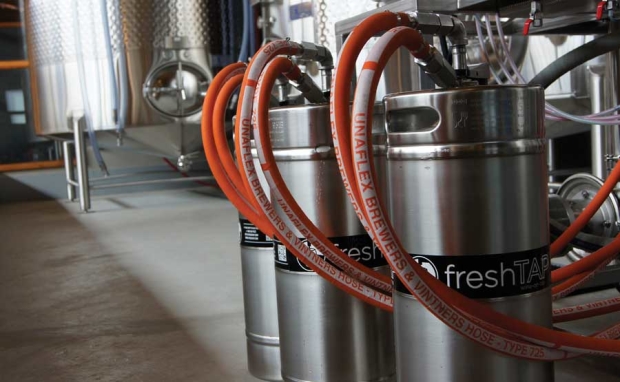
FreshTAP Logistics Inc. kegs wines for wineries in its Vancouver, B.C. warehouse, part of its centralized distribution service.(Courtesy FreshTAP Logistics Inc.)
Securing good quality fruit is fundamental to making good wine, but making sure consumers enjoy that wine in the best possible condition is often out of the hands of the winemaker.
Top-notch bottling practices are nothing against the risks posed by poor storage and oxidation once the wine is opened — a serious problem given the popularity of by-the-glass lists at many restaurants.
Often, limiting the choices available to consumers is the only way to make sure bottles aren’t opened for single pours and left to deteriorate, which is a waste of both good wine and money.
To facilitate single pours with minimum waste, some wineries have turned to steel kegs that are both reusable and provide an airtight container to keep wine fresh to the last drop.
“We get both the glass pour as well as a list on the bottle program,” said Rob Summers, winemaker with Hester Creek Estate Winery in Oliver, British Columbia. “It supports our bottle program, and it also gives us a chance to get the glass pours or house wine pours where we may not have had an opportunity.”
Hester Creek experimented with wines in beer kegs in the past, but what seemed like a good idea fell short because the wines rapidly oxidized.
The winery revisited the idea in 2012 when FreshTAP Logistics Inc. of Vancouver, British Columbia, introduced a keg system developed by Free Flow Wines LLC in California.
A blend of nitrogen and carbon dioxide gas prevents oxidation as the 20-liter (5.2-gallon) kegs are tapped, ensuring wines remain fresh.
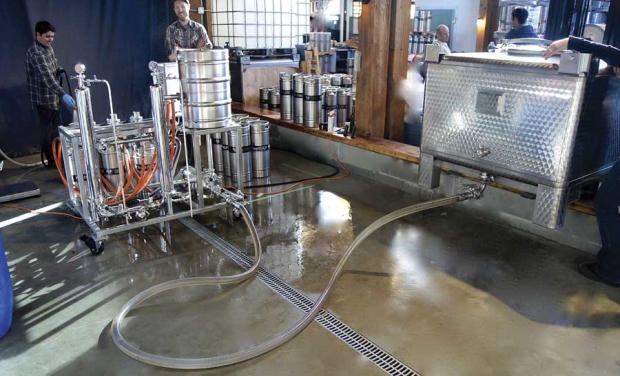
Wineries send wine in totes (and other containers) to FreshTAP Logistics Inc. for kegging and distribution. (Courtesy FreshTAP Logistics Inc.)
Hester Creek is now one of approximately 80 wineries using FreshTAP, which has approximately 12,000 kegs circulating among more than 600 restaurants across Canada. A separate kegging facility in Ontario serves FreshTAP clients in that province.
Growth was slow at first, but kegs have caught on, and FreshTAP managing director Mike Macquisten is looking at expansion opportunities.
“It’s finally caught up to the point where we’re really excited about where it’s going,” he said. “There’s been a surge of new business and new customers, and I think it just takes awhile for people to really understand the category.”
The system that FreshTAP uses isn’t the only option available to wineries.
Steel kegs from Torr Industries of Redding, California, hold a wine-filled polyethylene pouch that serves as a sophisticated bag-in-box system.
The pouch is recyclable and addresses the issue of returning an empty steel keg for cleaning and refilling. This amounts to low packaging and shipping costs, although some winemakers detect an influence of the plastic in the taste of their wines.
There are also plastic kegs on the market. While more prone to cracking than steel, they’re lightweight and recyclable, reducing shipping costs and facilitating disposal.
Both of these options address one of the most complex aspects of kegged wines: custody of the kegs themselves.
The steel kegs FreshTAP uses cost approximately $100 each, a significant capital investment as well as a significant loss if they’re stolen.
Recognizing the issues, FreshTAP serves as the linchpin in the distribution network connecting wineries and restaurants.
Wineries in British Columbia give FreshTAP a vessel filled with wine that’s taken to its warehouse in Vancouver for repackaging and distribution.
Wineries need only track the vessel FreshTAP picks up, while FreshTAP manages the kegs that restaurants receive.
Restaurants also deal with fewer distributors, rather than having every winery deliver its kegs (as is the case in Ontario).
“They get to just make one phone call, and they don’t have to worry about it all the way through to the end customer,” Macquisten said of wineries.
Direct TAP, a division of FreshTAP that also handles nonkegged products, such as cider, spirits and craft beer, oversees distribution.
By boosting the range of products it distributes, FreshTAP was able to visit restaurants and retailers three to four times a week, allowing prompt recovery of kegs. Since wineries pay a per-day fee for the kegs, centralization also saves wineries money.
“(We) distribute for over 40 craft breweries and cideries,” Macquisten said. “We have built some really cool software that allows all the manufacturers to tee up their orders and then they go on our trucks, and they get routed. It really helps us with our keg operation, because we’re able to pick those kegs up and have the turn-around much faster.”
The responsiveness impresses Summers, who is impressed at the growth of his kegged wine sales.
“Before, we had a lot of issues getting empty kegs back,” he said. “With Direct Tap, they’ve been able to tighten that up a lot, and it’s made it a lot less painful for us and a lot more organized, for sure.”
Hester Creek is now moving more than 2,500 cases a year of Pinot Gris and Merlot via kegs, reducing its packaging requirements as well as allowing tighter control of what it’s shipping to restaurants.
The distribution network has also helped Kate Garthwaite, co-founder of Left Field Cider Co. in Logan Lake, British Columbia, which signed on with Direct Tap at the beginning of November 2015 after three years of self-distribution.
“It was getting to be a bit much,” she said. “We were at a point where it was taking a lot of time away from production.”
Garthwaite still makes regular trips to Vancouver, but having regular, consistent distribution allows her to be more flexible about when she travels and allows her to spend more time with clients when she is there, rather than having to bustle off to the next delivery.
Growth opportunities are now drawing additional players into the sector, with Versay Inc. of Quebec offering imported wines in kegs for a broad range of restaurants across Canada.
“It’s more widely accepted now; there’s next to no resistance to the fact that you’re talking about wine in kegs,” said Jean-François Bieler, president of Versay. “The initial reluctance some buyers and some restaurant owners might have had is disappearing fast. So that’s a good thing.” •
– by Peter Mitham, a freelance writer based in Vancouver, British Columbia.


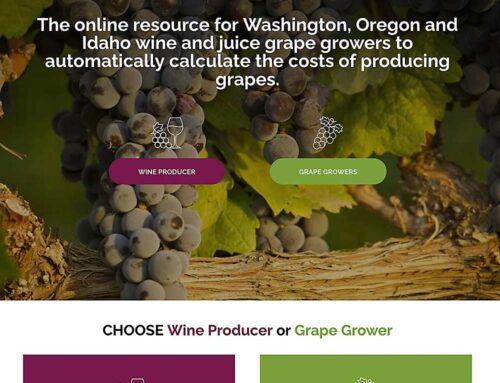
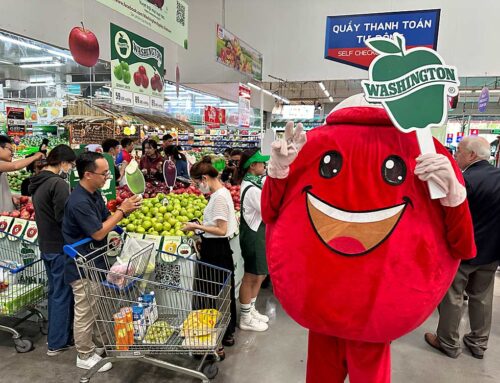

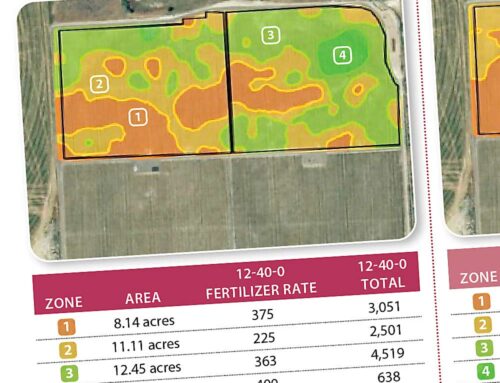
[…] Uncorked potential with wine on tap Securing good quality fruit is fundamental to making good wine, but making sure consumers enjoy that wine in the best possible condition is often out of the hands of the winemaker. Top-notch bottling practices are nothing against the risks posed by … Read more on Good Fruit Grower […]